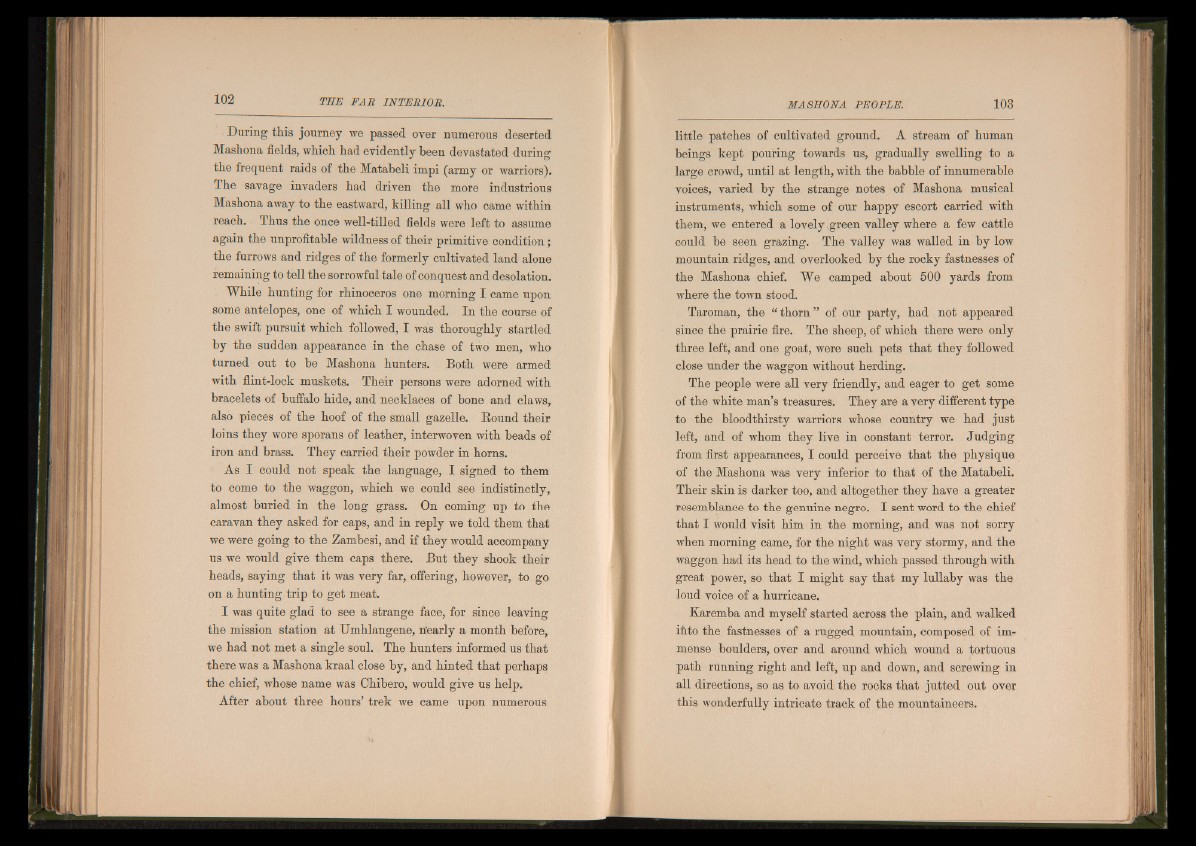
During this journey we passed over numerous deserted
Mashona fields, which had evidently been devastated during
the frequent raids of the Matabeli impi (army or warriors).
The savage invaders had driven the more industrious
Mashona away to the eastward, killing all who came within
reach. Thus the once well-tilled fields were left to assume
again the unprofitable wildness of their primitive condition;
the furrows and ridges of the formerly cultivated land alone
remaining to tell the sorrowful tale of conquest and desolation.
While hunting for rhinoceros one morning I came upon
some antelopes, one of which I wounded. In the course of
the swift pursuit which followed, I was thoroughly startled
by the sudden appearance in the chase of two men, who
turned out to be Mashona hunters. Both were armed
with flint-lock muskets. Their persons were adorned with
bracelets of buffalo hide, and necklaces of bone and claws,
also pieces of the hoof of the small gazelle. Bound their
loins they wore sporans of leather, interwoven with beads of
iron and brass. They carried their powder in horns.
As I could not speak the language, I signed to them
to come to the waggon, which we could see indistinctly,
almost buried in the long grass. On coming up to the
caravan they asked for caps, and in reply we told them that
we were going to the Zambesi, and if they would accompany
us we would give them caps there. But they shook their
heads, saying that it was very far, offering, however, to go
on a hunting trip to get meat.
I was quite glad to see a strange face, for since leaving
the mission station at Umhlangene, n'early a month before,
we had not met a single soul. The hunters informed us that
there was a Mashona kraal close by, and hinted that perhaps
the chief, whose name was Chibero, would give us help.
After about three hours’ trek we came upon numerous
little patches of cultivated ground. A stream of human
beings kept pouring towards us, gradually swelling to a
large crowd, until at length, with the babble of innumerable
voices, varied by the strange notes of Mashona musical
instruments, which some of our happy escort carried with
them, we entered a lovely .green valley where a few cattle
could be seen grazing. The valley was walled in by low
mountain ridges, and overlooked by the rocky fastnesses of
the Mashona chief. We camped about 500 yards from
where the town stood.
Taroman, the “ thorn” of our party, had not appeared
since the prairie fire. The sheep, of which there were only
three left, and one goat, were such pets that they followed
close under the waggon without herding.
The people were all very friendly, and eager to get some
of the white man’s treasures. They are a very different type
to the bloodthirsty warriors whose country we had just
left, and of whom they live in constant terror. Judging
from first appearances, I could perceive that the physique
of the Mashona was very inferior to that of the Matabeli,
Their skin is darker too, and altogether they have a greater
resemblance to the genuine negro. I sent word to the chief
that I would visit him in the morning, and was not sorry
when morning came, for the night was very stormy, and the
waggon had its head to the wind, which passed through with
great power, so that I might say that my lullaby was the
loud voice of a hurricane.
Karemba and myself started across the plain, and walked
ihto the fastnesses of a rugged mountain, composed of immense
boulders, over and around which wound a tortuous
path running right and left, up and down, and screwing in
all directions, so as to avoid the rocks that jutted out over
this wonderfully intricate track of the mountaineers.